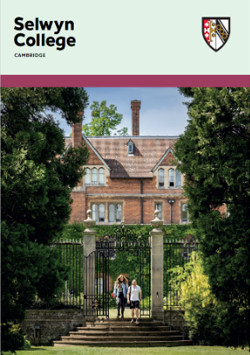Key facts
- Typical offer conditions - A*A*A or IB 43 overall with 776 to 777;
- Required subjects - Chemistry and 1 science/maths;
- Admissions Tests - ESAT;
- Interviews - 1 or 2 subject and 1 general;
- Written work - none;
- Average offers made - 5
The Subject at Selwyn
All pre-clinical lectures and practical work are organised by the University and take place on or near the Downing Site in the centre of Cambridge, where the Departments of Anatomy, Physiology, Biochemistry, Pathology and Pharmacology are situated.
The Downing Site is five minutes bicycle from Selwyn. The College arranges supervisions which take place in groups of 3-4 students for an hour a week in each subject. Written work is presented for comment by the supervisor and there is an opportunity to clarify topics from lectures. Supervisions are arranged by the Director of Studies in Veterinary Medicine, who also advises on course choice.
In the first year all veterinary students take courses which cover veterinary anatomy, physiology, biochemistry and farm animal husbandry, together with a course 'Preparing for the Veterinary Profession' which lays a foundation for later clinical studies. Part IA of the Medical and Veterinary Sciences Tripos is taken at the end of the first year. The 2nd MB is part of this examination and candidates who fail this section in any course must take and pass a 2nd MB examination in that subject in September of the same year.
In the second year the courses cover reproductive biology, neurobiology and animal behaviour, pathology, pharmacology and comparative vertebrate biology. Here too, in the Tripos examination (MVST Part IB), there is a 2nd MB section in each subject, in which a pass must be obtained.
In their third year most veterinary students study a single subject in depth, which leads to a Part II Tripos examination. All subjects include either a research project or a literature dissertation Veterinary students often read Part II Zoology or may choose a course related to those studied in the first two years.
Teaching Arrangements
The Director of Studies in Veterinary Medicine is Dr Stuart Eves (College Lecturer in Veterinary Medicine). Dr Julia Riggs (University Soft Tissue Surgeon), acts a Clinical Adviser to our students.
Qualities we are looking for
At the interviews we are very much aware that we are choosing future veterinary surgeons and not just bright students. High academic ability is, however, essential. We need students who will take an active part in the community of the College and give to the College and their colleagues as much as they take out of it themselves.
Subject requirements
Applicants must have A-Level Chemistry and at least one of Biology, Mathematics or Physics. Most applicants for Veterinary Medicine at Cambridge have at least three science/mathematics A-Levels.
If you are studying Mathematics at IB Higher Level, we recommend Analysis & Approaches for the most competitive application.
Experience of the veterinary profession and allied experiences is required, but there is no fixed duration of experience. We ask that students feel they are aware of the role of a veterinary surgeon and the challenges of the profession.
Admissions Assessment - ESAT
As at other Colleges, applicants will be asked to take the ESAT (Engineering and Sciences Admissions Test). You must be registered in advance (separately to your UCAS application) to take the assessment. The test is taken at your local Pearson VUE test centre. Please see the UAT-UK website for full and further details.
Interviews
Applicants will have one or two subject interviews. In one interview an assessment will be made of the candidate's suitability to read Veterinary Medicine. Discussion may include such wide-ranging issues as work experience, moral issues, important veterinary developments in both scientific and healthcare fields, and biological basic principles. In the other more scientific interview, assessment will be made of the applicant's ability to think clearly and develop a logical argument on a familiar topic from A-Level coursework. This interview will be concerned to probe candidates' scientific understanding and their ability to reason.
Secondly, candidates have a general interview with the Admissions Tutor (Sciences). This is designed to learn about interests and activities outside Veterinary Medicine, motivation in choosing to study the subject at Cambridge and the maturity of approach towards academic work.
March 2026


